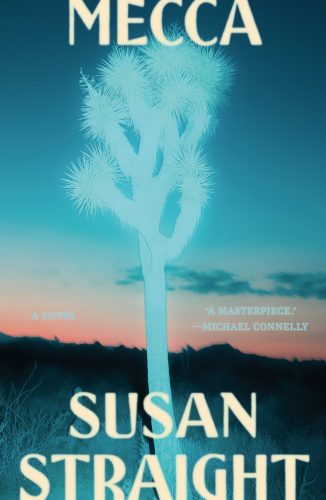Book Review: “Mecca” — A Wonder of an American Canvas
By Drew Hart
This is an immensely complex, deeply atmospheric story of the working class, of immigrants with global origins, many who are descendants of early settlers.
Mecca by Susan Straight. Farrar, Straus and Giroux, 370 pp.

In days of yore, Hank Grant, the longtime broadcaster for KNX radio, the CBS affiliate in LA, used to begin every report with “From Point Conception… to the Mexican border!” But this only takes in the coast of Southern California, which meanwhile runs far inland, through the industrial and agricultural plain of the Inland Empire, to the Sonoran and Mojave deserts, and includes worlds of people rarely seen in the popular mythology of the region. Susan Straight’s novel Mecca takes us there, and within it, few “real housewives,” surfer brahs, or show folk turn up. This is a land of the working class, of immigrants with global origins, many who are descendants of early settlers — and this is its story — immensely complex, deeply atmospheric.
Opening chapters are devoted to a portrait of a CHP motorcycle cop, one Johnny Frias. His patrol ranges across the freeways of Orange and Riverside counties, home to the Santa Ana winds and the “almost-stopped traffic… some of the worst congestion in America.” In his path are oodles of agitated and crazy drivers, many showing awful racist colors; Johnny’s Mexican heritage, even while he was born where he is now, subjects him to that. But he rolls on, living with his widower father on an old and hidden cattle and horse ranch in one of the canyons — one of the wild ones left that “nobody could level,” that always burn and flood.
“And then, the bones” … Johnny’s forty and it’s 2020, but he remains haunted by an incident from twenty years before, when he shot a man dead, interrupting a canyon rape scene, and burying him; he still dreads rains that might uncover the skeleton. The rapist’s victim ran away, leaving a wallet behind; Frias has feared she could turn him in for the murder, and uses it to track her down to an estate in Hollywood. For years the trail has remained cold. Meanwhile, he’s spending his life with longtime friends that attended police academy with him (only Frias graduated), with their wives, girlfriends, and their sons. Many of these have their own stories woven into Mecca; they are butchers, florists, animal control officers, citrus packing house employees, and nurses. (To be truly up to date, perhaps there should be one slaving away in an Amazon distribution center?) At one point, they band together to protect Johnny’s ranch from a fire started by a spark from a truck’s loose fender; fortunately the wind blows the blaze the other way, but not before a massive firefighting effort, with planes dropping retardant. Another episode puts him on his friends’ bad side, since he’s in law enforcement — a nurse’s son is killed in an accidental nighttime shooting, when a rookie cop mistakes a cellphone for a gun. The boy’s father, a black man from Louisiana, attacks Frias at a wake.
Johnny’s is not the only story in this tapestry-like novel, though. Later on, we spend time with Ximena, a young Oaxacan woman who has been smuggled into the U.S. by a coyote. Her brother drowned crossing a canal at the border. She’s living with relatives in a protected compound on an Indian reservation — safe from Trump’s ICE — working as a housekeeper at a plastic surgery institute in Palm Springs. When she discovers an infant abandoned in one of the rooms, she panics and runs off with it, depositing it at a hospital, terrified of being connected with the incident. Ximena flees to LA, to other relatives, and becomes a maid on an estate. And this is the germ of the idea that underlies this book: the woman who employs her is the rape victim seen in the canyon long before, and she’s the mother of the woman who abandoned the infant in the plastic surgery institute. It seems it’s more like only two degrees of separation — run-ins between these characters occur and recur. The background includes portions set in the era of COVID, which adds an extra layer of anxiety for all. In an episode stirring things up further — this one imaginary, perhaps — LA is thrown into chaos when hackers bring the internet down and ATMs and gas pumps are out of commission.
Mecca heads for an ending in which many of its storylines converge, or nearly so, in the California low desert, near its eponymous town. Maybe it’s possible to become annoyed by some of the interwoven plotting — it could be accused of being too convenient. But it’s more important to overlook this and focus on the novel’s real value: it’s a wonder of a canvas depicting one of modern America’s most dimensional societies, rendered with a beautiful authenticity. And the plot conveniences are handled so nimbly that it is easy to ignore them. At first, it seems to be like a police story, something from Raymond Chandler or John D. MacDonald, but the book soon branches out into so many tangents that it transcends any genre. Your F.C. (‘faithful correspondent’), who has lived for decades in Southern California, would liken it to broad cinematic attempts to capture the region, e.g. Chinatown, or Heat. Pretty lofty company, and rightfully deserved.
Drew Hart writes from Santa Barbara, California

